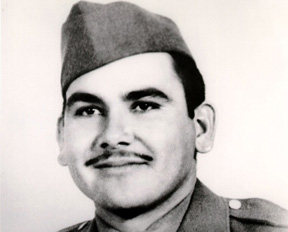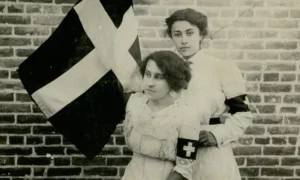
Private Felix E. Longoria from Three Rivers, Texas, was one of the soldiers who gave his life during World War II. Felix Longoria was drafted into the U.S. Army in 1944, and completed six weeks of basic training in Fort Ord, California with the 27th Infantry Regiment of the 25th Infantry Division. He was deployed to Luzon Island for his first combat assignment as an infantry man. He soon volunteered to join a patrol with orders to dislodge enemy snipers. Army Private Longoria was killed in 1945 at the age of 25 by a Japanese sniper and was awarded a Bronze Service Star, a Good Conduct Medal and a Combat Infantryman’s Badge.1 His remains were not recovered and identified until 1949 when they were returned to Three Rivers, Texas, his hometown.2
World War II, a global war, lasted from 1939 to 1945 and was the deadliest conflict in human history. The National WWII Museum reports over 500,000 Latinos (including 350,000 Mexican Americans and 53,000 Puerto Ricans) served in WWII. However, exact numbers are difficult to calculate because except for the 65th Infantry Regiment from Puerto Rico, Latinos were not segregated into their own units the way African Americans were.3 This article is not about World War II itself, instead it tells the story of one of our own Mexican American World War II Heroes from Texas. This affair shows how his community discriminated against him and his family after the war had ended despite his heroic military service for the US.
Three Rivers, Texas is a small town between Corpus Christi and San Antonio known for its hunting and fishing. In the early 1900’s, the main industries were a glass factory and a natural gas refinery. As most towns in the deep South, Three Rivers was ripe with racial segregation and discrimination. In South Texas in the 1940’s, Mexican Americans were treated as second class citizens despite many having their U.S. Citizenship. All were called Mexicans, they were turned away from local shops, swimming pools, and even banned from the barbershops. Signs were posted declaring, “No dogs, no blacks or Mexicans allowed” and “We serve whites only, no Spanish or Mexicans.”4 It was still a time when many Mexican women could only work as cleaning ladies, for Anglo families, sometimes getting paid as little as 15 cents for a day’s work. Mexicans were considered non-white despite being counted as whites on the census.5 World War II caused the nation to reexamine the laws. The Texas Legislator’s 1943 “Caucasian Race Resolution” granting Latin Americans status as “white” citizens notwithstanding.6 Thousands of Latino-American veterans returned from the war to find they were still second class citizens at home. The town of Three Rivers was no exception, Mexican Americans still lived on one side of the railroad tracks with Spanish street names and whites on the nicer side of the tracks.
Small towns were usually quick to acknowledge the death of American Heroes but not for Private Longoria’s. In mourning the death of her husband, Beatrice Longoria was to make arrangements for the wake service that she wanted to hold in their hometown. When she spoke to the Rice Funeral home, the only funeral home in town, the director, Tom Kennedy, declined to plan the service because he explained Felix Longoria was “Mexican” and because “the whites would not like it.”7 Mr. Kennedy was willing to set up a wake at the Longoria home as was the customary treatment of Mexican Americans by the Three Rivers community. Kennedy at one time was in the military, where he fought in Europe, suffered shrapnel wounds and was hospitalized until he went back to the United States. Therefore, it came as a surprise that Kennedy had no compassion for his fallen brother at arms.

Though Felix Longoria’s father had purchased a family plot on the Westside of the town where there was a fence that separated the Mexicans from the all-white burial plots, it was the service for the wake where the outrage began. All Beatrice Longoria wanted was for her husband’s service to be in his hometown with family and friends. Mr. Kennedy angered the Mexican-American community by not allowing the wake to be held at the funeral home. How was it that his ethnicity rather than his ultimate sacrifice for the country mattered more in determining whether he would received a proper burial with full honors. Hurt, confused, and in mourning, Beatrice’s sister Sarah Posas contacted Dr. Hector P. Garcia, a civil rights organizer. Dr. Garcia was no stranger to this type of discrimination so he agreed to help the Longoria family. Many time he was told, “You are not Americans, you are Mexicans” Dr. Garcia would respond by saying, “Well, we are American citizens of Mexican origin, so let’s point out to the people we are really Americans”.8 As a civil rights activist, he used his wartime skills to organize the community. He then contacted Senator Lyndon B. Johnson in Washington. Senator Johnson saw this as a national cause and took it all the way to the White House. The decision to bury Felix Longoria in a place other than Three Rivers became a collective demand for justice, dignity and equality. With collaborated work from Dr. Garcia and Senator Johnson, Felix Longoria’s remains were re-interred on February 16, 1949 in Arlington National Cemetery with full military honors.9 Dr. Garcia founded the American GI Forum in 1948 to help Military Veterans who needed assistance to receive the services and benefits they had earned as soldiers.
In 2010, Santiago Hernandez a resident from Corpus Christi gained permission from the funeral home owner to place a Texas Historical Marker on the property in memory of Felix Longoria. This came with some opposition from many white commission members, but the marker was placed. In 2014, under new management, the funeral home was demolished and converted into a parking lot. The original historical marker was allegedly hit by a driver who backed up into it and was removed. Santiago Hernandez later tried to convince the Three Rivers community to rename the local post office after Private Felix Longoria since the Texas Historical Marker had been damaged and not replaced. 10 Many community residents did not support the idea. Since the post office is a Federal building, renaming it requires a bill in the US Congress. Mr. Hernandez then contacted Congressman Lloyd Doggett who represented the Three Rivers area to inquire whether he would help change the name of the Post Office to honor Longoria. On July 22, 2004 Congressman Doggett proposed to the House of Representatives Bill 4911 that designated the United States Postal Service located in Three Rivers, Texas, as the “Private Felix Z. Longoria Veterans’ Memorial Post Office”.11

After all these years, the story about Felix Longoria, which became a catalyst for the American GI Forum and the spread of civil rights and pride among Mexican Americans is rarely spoken about in Three Rivers, Texas. Many residents still deny discrimination and segregation within the town were the motives. Talking to the townspeople many say, “This was never about race”.12 The discrimination against Felix Longoria remain unspoken when travelers from distant areas come to learn about where the Longoria Affair began. You would assume, given that a historical moment occurred in Three Rivers would be especially vigilant about anything involving the Longorias and the right for equality, but no one-including the mayor, the owner of the property who reportedly tore down the structure and members of the historical commission would speak about Felix Longoria. The Felix Longoria marker was replaced years later, it is now located on the city square in Three Rivers. 13

Some might ask why resurrect such memories and not just let the memory of Felix Longoria rest in Arlington National Cemetery alongside all other war heroes. This ghost of their past haunts the town and many would prefer to forget about it. However, communities must make amends for the many wounds inflicted by discrimination against the heroes who sacrificed their lives for the United States of America. The Historic Marker is but one small way to redress decades of open discrimination against Mexican American Veterans. This fight and ultimate victory that validates the full Citizenship rights of those born American and from Hispanic or Mexican ethnicity changed the lives of everyone in the town. Private Felix Longoria made history while alive in World War II and after his death continued to challenged discrimination in Three Rivers, Texas. While it may be a time in history some would rather not remember, the Longoria Affair sheds light, honor, and prestige forever on the Mexican American Community and the sacrifices of Gold Star families regardless of ethnicity.
- Patricia Portales, “An affair to Remember,” in San Antonio Current, august 11, 2010. ↵
- “Felix Longoria,” 1994-2011, Arlington National Cemetery, Website. www.arlingtoncemetery.net. ↵
- The National World War II Museum, Los Veteranos – Latinos in WWII, retrieve on 5/1/2020 from www.nationalww2museum.org . ↵
- Ruben Narrette Jr., “Navarette: Injustice for an American Veteran”, Press Democrat, November 10, 2010. ↵
- Ruben Narrette Jr., “Navarette: Injustice for an American Veteran”, Press Democrat, November 10, 2010. ↵
- Zachary Foust, “Caucasian Race Resolution’, July 9, 2019, Handbook of Texas Online, http://www.tshaonline.org/handbook/online/articles/mlc04. ↵
- Patricia Portales, “An affair to Remember,” in San Antonio Current, august 11, 2010. ↵
- Hector Garcia, interview, Mexican American Experience, July 9, 1969, hosted by David G. McComb, https://www.drhectorgarciafoundation.org. ↵
- Carroll, Patrick. Felix Longoria’s Wake, Publisher: The University of Texas Press, 2003. ↵
- John J. Valadez, The Longoria Affair. (2010) Boston: PB Distribution 2010. DVD. ↵
- R. 4911, July 22, 2004, 108th Congress 2 D Session. ↵
- Bob Richter, “Consider the other side of the ‘Longoria affair,'” San Antonio Express News, January 7, 2012. ↵
- Elaine Ayala, “Longoria marker to get new spot in Three Rivers,” San Antonio Express News 2015. ↵



92 comments
Esmeralda Gomez
The story of Longoria is a story that tells a tale like no other; this is a story of a hero who was discriminated against for his skin color, despite serving his country. This story leaves hope that in the future, we can make amends and correct the mistakes of our past that have hurt others. Such an inspiring story told in a beautiful manner, amazing job.
Matthew Holland
I appreciate the author of this story including so much detail about the situation surrounding the struggle for Private Felix E. Longoria’s legacy. I am thankful this story was brought to light as I had not heard of this situation before. This story I believe serves as a powerful reminder of just how far we have come as a country and a society, and just how terrible some people were in the past. But it also shows just how powerful social movements created by members of society can be and how they can accomplish seemingly impossible things while meeting intense resistance.
Aaron Onofre
It makes my heart heavy when looking back at the pain many of the towns here in Texas has caused to many minorities throughout the past. In the case of Private Longoria, his story shows the importance of doing what is right. Lyndon B. Johnson did not have to take this issue to the national level, but he did, because he thought that not only was right but also important.
Greitin Rodriguez
Heroes, like Private Felix E. Longoria, should be recognized in their hometown and nationally. He sacrificed his life for his family in service to the United States. Three Rivers, Texas hurt families who have lost loved ones who joined our military. This town failed to recognize the harm they inflicted, by not providing a resting place in the cemetery for Private Longoria simply because of his Hispanic ethnicity denying his military service and his heroism. Private Longoria was civically engaged in serving his country in the war. His family had to take up his engagement to fight for his rightful resting place. Having a historic marker for his grave does not erase the grief caused to his family but it is certainly one way to honor his heroism.
Andrew Ponce
This article in particular was very interesting to read, for the reason that its main subject focused on not what happened during the man’s life that made him known, but what happened once he died that made him known. Before reading this article, I personally had little to any thought that political figures as strong as Lindon B. Johnson would reach down and care for the resting place of a Mexican-American. This article is not only well written, but displays the power of what a community can accomplish when justice is demanded. Great work!
Kaylah Garcia
Lulu, hello! This article was incredible to read. I’ll admit that I was unaware of this case, and the writing was superb. It was able to provide a great deal of background knowledge and facts about Felix E. Longoria. The fact that so many Mexican Americans and Hispanics experienced such severe discrimination at the time makes me sad, but I’m delighted to know that they took action, with LBJ’s assistance. Although this piece is excellent and really pertinent to the subject, I would have wanted to learn more about Private Longoria’s early life. However, that may naturally be preserved for another article.
Carollann Serafin
This article is very touching and just shows how a simple thing such as a race can have such an. Impact on people whether positive or negative. I thought it was super wrong not letting proper funeral arrangements being made and alive or dead Felix was criticized for doing what he wanted which was serving his country. I believe it was an honorary portrayal of himself and it saddens me that there was no acknowledgement for him serving the country. I had never heard of Felix prior to this but I am happy I did.
Melanie Fraire
For someone to go out of their way and sacrifice their life for a country that treated him and his people as if they weren’t human, is already something very admirable and it’s shocking that no one recognized his bravery and even felt the need to disrespect him even after being killed. This article was very well written and I enjoyed how it was structured to show the sequence in which each event occurred chronologically.
Aaron Astudillo
The content of this article is very enlightening as I was unaware of the impact that Felix E. Longoria had on the culture of American politics. The way that Longoria’s legacy created the G.I forum, which aids veterans in receiving benefits, is phenomenal as it displays the impacts and progress of individuals of Latin descent.
Sierra Christa
I loved this article! As someone who had no prior knowledge on this topic and story you told it exceptionally well. I am shocked that Lyndon B. Johnson helped the family and Felix E. Longoria get the proper burial he deserved and fought for. It saddens me that this part of history is often times disregarded and covered up in small towns, but your article shines a light on the unfortunate truth of the past. Great job, telling the story many people wanted to cover up and giving a voice to those who fought diligently and honorably in the war.